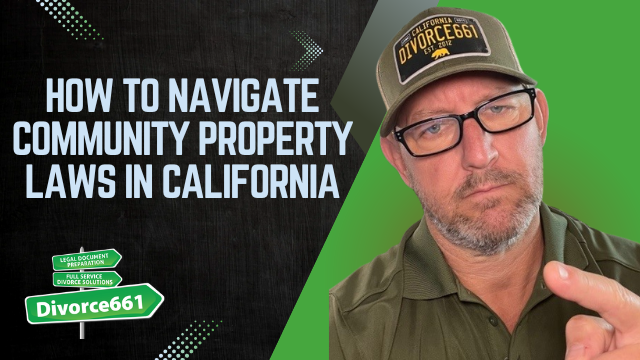How to Navigate Community Property Laws in California
If you are going through a divorce in California, you have probably heard the term community property. Understanding what it means and how it affects your divorce is essential to protecting your rights and avoiding costly mistakes. This guide breaks California community property law down into clear, practical steps so you know what to expect when dividing assets and debts.
What is community property?
Most assets and debts acquired during the marriage are considered equally owned by both spouses, regardless of who earned the money or whose name is on the account.
California is a community property state. That means property and debt obtained while you are married is generally considered jointly owned by both spouses and is subject to equal division at the time of divorce. Equal division usually means a 50 50 split of community property unless you agree otherwise or a court orders a different arrangement for a specific reason.
Common examples of community property
- Income earned by either spouse during the marriage
- Real estate purchased while married, such as the family home
- Vehicles acquired during the marriage
- Retirement accounts funded during the marriage, including 401k and pensions
- Credit card debt or loans taken on during the marriage
- Business assets or increased business value that arose during the marriage
What is separate property?
Not everything is community property. Separate property generally includes:
- Assets acquired before the marriage
- Gifts or inheritances specifically given to one spouse
- Property acquired after legal separation
- Items traced to separate funds or clearly documented as separate
Proving something is separate property may require documentation and tracing of funds. Without clear evidence, assets acquired during the marriage are often treated as community property.
Why the name on the title or account usually does not matter
In California, it does not matter whose name appears on a deed, account, or title. If the asset or debt was acquired during the marriage, it is presumed community property. For example, a retirement account or real estate titled in one spouse’s name can still be subject to equal division if earned or purchased during the marriage.
Real client example
A couple married for more than 15 years assumed each could simply keep what was in their own name. After a full asset review we explained that retirement accounts and real estate purchased during the marriage had to be divided equally under California law. Once they understood community property rules, they were able to reach a fair division that met court requirements.
How to divide community property fairly and efficiently
Follow these practical steps to navigate property division:
- Take inventory of assets and debts. Include bank accounts, investments, retirement accounts, real estate, vehicles, business interests, and liabilities.
- Classify each item as community or separate property. Gather documents that prove dates of acquisition, source of funds, and any prenuptial agreements.
- Value community assets. Get appraisals for real estate, account statements for retirement funds, and valuations for businesses.
- Propose a division plan. Consider whether offsets, tradeoffs, or side payments will achieve an equal split.
- Prepare a court ready agreement. Put terms in writing that clearly identify each party’s share and comply with court requirements.
- File and finalize. Submit agreements to the court or proceed to trial if you cannot reach agreement.
Common mistakes to avoid
- Assuming title equals ownership. Title does not override community property presumptions.
- Failing to trace separate funds. You must document separate property to exclude it from division.
- Overlooking debts. Credit card and loan debt acquired during marriage is usually community debt.
- Not getting professional help. Property division can be complex, especially with retirement accounts and business valuations.
Tips for a smoother property division
- Gather complete financial records early. Statements, deeds, tax returns, and retirement summaries speed the process.
- Consider mediation or an uncontested approach to reduce cost and stress.
- Use experts when needed. Appraisers, forensic accountants, and retirement plan administrators can provide necessary valuations and documents.
- Make agreements court ready. Clear documentation prevents delays and future disputes.
Next steps
If you want to make sure your property is divided correctly and avoid costly mistakes, schedule a consultation. Professional guidance helps you identify community versus separate property, negotiate a fair division, and prepare agreements that satisfy the court.
For a free consultation and help navigating California community property laws with clarity and confidence, visit Divorce661.com and schedule your appointment.

